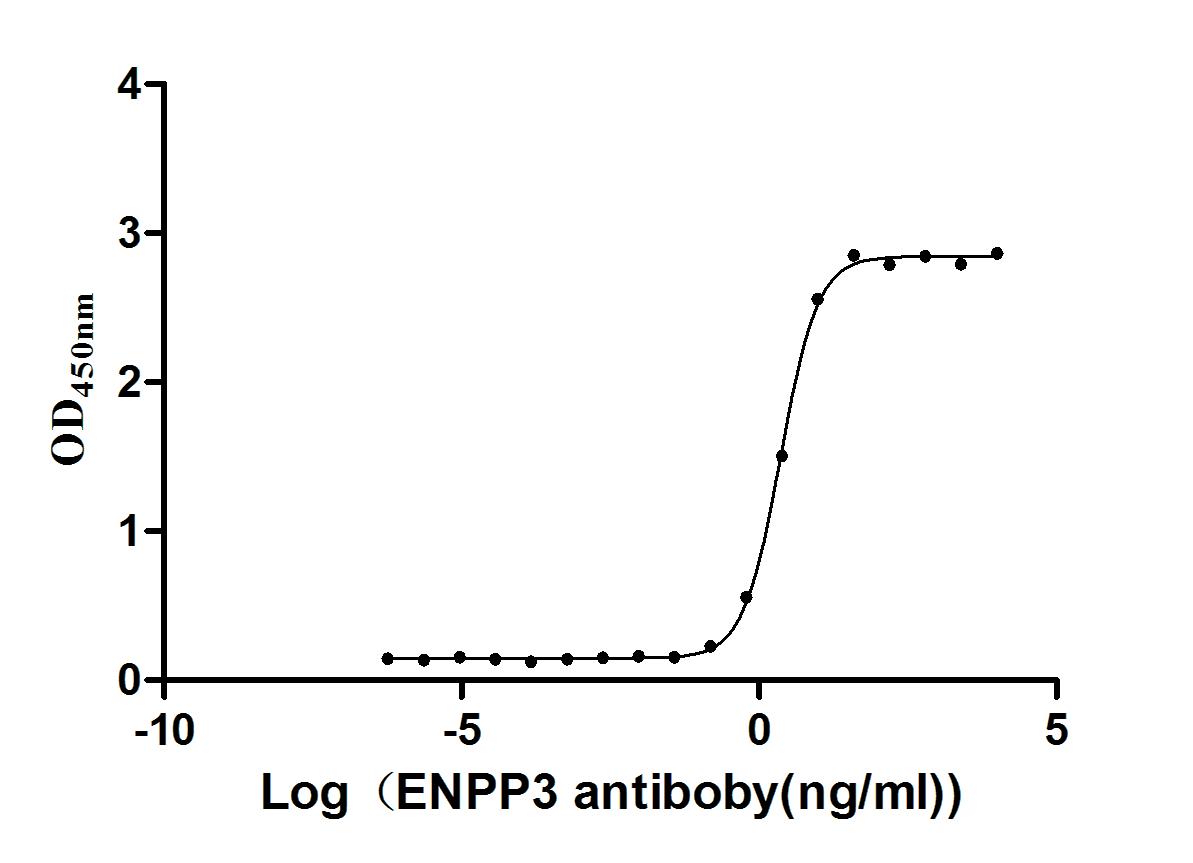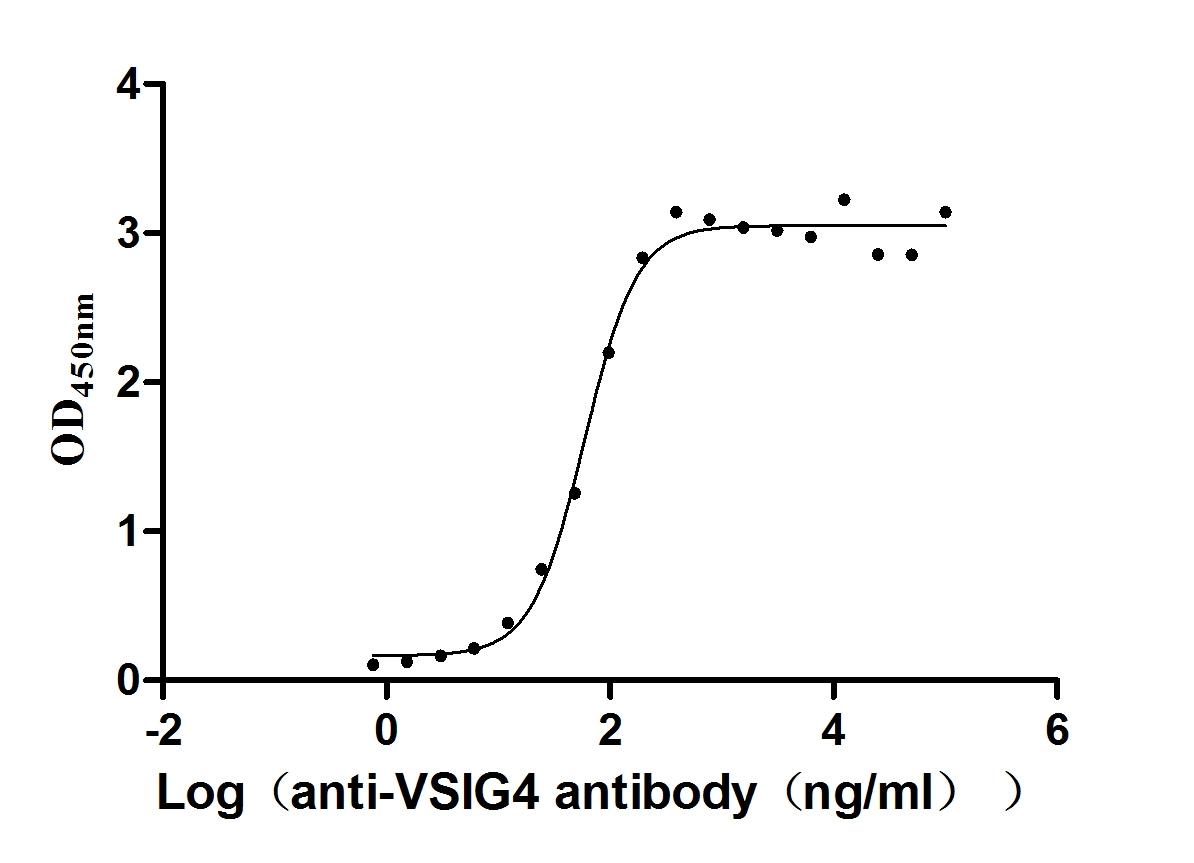Recombinant Mouse Beta-adrenergic receptor kinase 1 (Grk2)
In Stock Promotion產(chǎn)品詳情
-
純度:Greater than 90% as determined by SDS-PAGE.
-
基因名:
-
Uniprot No.:
-
別名:Grk2; Adrbk1Beta-adrenergic receptor kinase 1; Beta-ARK-1; EC 2.7.11.15; G-protein-coupled receptor kinase 2
-
種屬:Mus musculus (Mouse)
-
蛋白長度:Full Length
-
來源:E.coli
-
分子量:95.6kDa
-
表達(dá)區(qū)域:1-689aa
-
氨基酸序列MADLEAVLADVSYLMAMEKSKATPAARASKKILLPEPSIRSVMQKYLEDRGEVTFEKIFSQKLGYLLFRDFCLNHLEEAKPLVEFYEEIKKYEKLETEEERVVRSREIFDSYIMKELLACSHPFSKNATEHVQGHLVKKQVPPDLFQPYIEEICQNLRGDVFQKFIESDKFTRFCQWKNVELNIHLTMNDFSVHRIIGRGGFGEVYGCRKADTGKMYAMKCLDKKRIKMKQGETLALNERIMLSLVSTGDCPFIVCMSYAFHTPDKLSFILDLMNGGDLHYHLSQHGVFSEADMRFYAAEIILGLEHMHNRFVVYRDLKPANILLDEHGHVRISDLGLACDFSKKRPHASVGTHGYMAPEVLQKGVAYDSSADWFSLGCMLFKLLRGHSPFRQHKTKDKHEIDRMTLTMAVELPDSFSPELRSLLEGLLQRDVNRRLGCLGRGAQEVKESPFFRSLDWQMVFLQKYPPPLIPPRGEVNAADAFDIGSFDEEDTKGIKLLDSDQELYRNFPLTISERWQQEVAETVFDTINAETDRLEARKKAKNKQLGHEEDYALGKDCIVHGYMSKMGNPFLTQWQRRYFYLFPNRLEWRGEGEAPQSLLTMEEIQSVEETQIKERKCLLLKIRGGKQFVLQCDSDPELVQWKKELRDAYREAQQLVQRVPKMKNKPRSPVVELSKVPLIQRGSANGL
Note: The complete sequence including tag sequence, target protein sequence and linker sequence could be provided upon request. -
蛋白標(biāo)簽:N-terminal 6xHis-SUMO-tagged
-
產(chǎn)品提供形式:Liquid or Lyophilized powder
Note: We will preferentially ship the format that we have in stock, however, if you have any special requirement for the format, please remark your requirement when placing the order, we will prepare according to your demand. -
緩沖液:If the delivery form is liquid, the default storage buffer is Tris/PBS-based buffer, 5%-50% glycerol.
Note: If you have any special requirement for the glycerol content, please remark when you place the order.
If the delivery form is lyophilized powder, the buffer before lyophilization is Tris/PBS-based buffer, 6% Trehalose. -
儲存條件:Store at -20°C/-80°C upon receipt, aliquoting is necessary for mutiple use. Avoid repeated freeze-thaw cycles.
-
保質(zhì)期:The shelf life is related to many factors, storage state, buffer ingredients, storage temperature and the stability of the protein itself.
Generally, the shelf life of liquid form is 6 months at -20°C/-80°C. The shelf life of lyophilized form is 12 months at -20°C/-80°C. -
貨期:3-7 business days
-
注意事項:Repeated freezing and thawing is not recommended. Store working aliquots at 4°C for up to one week.
-
Datasheet & COA:Please contact us to get it.
相關(guān)產(chǎn)品
靶點(diǎn)詳情
-
功能:Specifically phosphorylates the agonist-occupied form of the beta-adrenergic and closely related receptors, probably inducing a desensitization of them. Key regulator of LPAR1 signaling. Competes with RALA for binding to LPAR1 thus affecting the signaling properties of the receptor. Desensitizes LPAR1 and LPAR2 in a phosphorylation-independent manner. Positively regulates ciliary smoothened (SMO)-dependent Hedgehog (Hh) signaling pathway by facilitating the trafficking of SMO into the cilium and the stimulation of SMO activity. Inhibits relaxation of airway smooth muscle in response to blue light.
-
基因功能參考文獻(xiàn):
- Enhanced GRK2 expression triggers cardiac hypertrophy by GRK2-PI3Kgamma mediated Akt phosphorylation and subsequent inactivation of GSK3beta. PMID: 28759639
- Grk2 rescuing activity requires the integrity of domains essential for its interaction with GPCRs, we speculate that Grk2 may regulate Hh pathway activity by downregulation of a GPCR. PMID: 27113758
- The main novelty presented here is to show that septic shock induces cardiac hyporesponsiveness to isoproterenol by a mechanism dependent on nitric oxide and mediated by G protein-coupled receptor kinase isoform 2. Therefore, G protein-coupled receptor kinase isoform 2 inhibition may be a potential therapeutic target in sepsis-induced cardiac dysfunction. PMID: 28526706
- Data, including data from studies in heterozygous knockout mice, suggest that Grk2 is involved in TNFalpha-induced wound healing in epithelial cells of the colon; Grk2 appears to inhibit TNFalpha-induced apoptosis; Grk2 inhibits TNFalpha-induced ERK activation by inhibiting generation of reactive oxygen species. Homozygous knockout of Grk2 is embryonically lethal in mice. PMID: 28572156
- GRK2 upregulation causes kappa-opioid receptor desensitization in diabetic heart PMID: 27865836
- study provides the first insights into the role of GRK2 in skeletal muscle physiology and points to a role for GRK2 as a modulator of contractile properties in skeletal muscle as well as beta2AR-induced hypertrophy. PMID: 27566547
- GRK2 loss confers a protective advantage over control mice after myocardial ischemia/reperfusion injury. Fibroblast GRK2 knockout mice presented with decreased infarct size and preserved cardiac function 24 hours post ischemia/reperfusion. They had decreased fibrosis and fibrotic gene expression. These protective effects correlated with decreased infiltration of neutrophils to the ischemia site and decreased TNF-alpha. PMID: 27601479
- this study shows that astragaloside IV alleviates E. coli-caused peritonitis through modulating GRK2-CXCR2 signal in neutrophils PMID: 27543854
- GRK2 down-regulation is cardioprotective during diet-induced obesity, reinforcing the protective effect of maintaining low levels of GRK2 under nutritional stress, and showing a role for this kinase in obesity-induced cardiac remodeling and steatosis. PMID: 27832814
- The betaARKrgs peptide, but not endogenous GRK2, interacted with Galpha(q) and interfered with signaling through this G protein. These data support the development of GRK2-based therapeutic approaches to prevent hypertrophy and heart failure. PMID: 27016525
- GRK2 is localized in the mitochondria and its kinase activity negatively impacts the function of this organelle by increasing superoxide levels and altering substrate utilization for energy production. PMID: 26506135
- Erythropoietin seems to reverse sepsis-induced vasoplegia to NE through the preservation of alpha1D adrenoceptor mRNA/protein expression, inhibition of GRK2-mediated desensitization, and attenuation of NO overproduction in the mouse aorta. PMID: 26025460
- In vitro, GRK2 inhibits Epac1-to-Rap1 signaling by phosphorylation of Epac1 at Ser-108 in the Disheveled/Egl-10/pleckstrin domain. GRK2 inhibits Epac1-mediated sensitization of Piezo2 which contributes to inflammatory mechanical hyperalgesia. PMID: 26929333
- GRK2 ablation increases circadian amplitude and decreases circadian period. GRK2 suppresses mPeriod1 transcription,PERIOD1/2 nuclear trafficking and promotes PERIOD2 phosphorylation. PMID: 26279567
- These results suggest GRK2 contributes to melanopsin deactivation, but that other mechanisms account for most of modulation of melanopsin activity in ipRGCs. PMID: 26069965
- data suggest that inhibiting GRK2 could reverse an established insulin-resistant and obese phenotype PMID: 26198359
- Post-MI AdipoR1 phosphorylation positively correlated with the expression level of GRK2. AdipoR1 is phosphorylatively modified and desensitized by GRK2 in failing cardiomyocytes, contributing to post-MI remodeling and HF progression. PMID: 25696921
- findings indicate that the balance between mechanisms regulating vascular tone are shifted to favor vasoconstriction in the absence of GRK2 expression and that this leads to the age-dependent development of hypertension PMID: 25561731
- Data indicate that G protein-coupled receptor kinase 2 (GRK2) downregulation enhances insulin signaling in adult mouse hearts. PMID: 25239306
- Findings reveal a cell-type-specific role for GRK2 in the regulation of normal motor behavior, sensitivity to psychostimulants, dopamine neurotransmission, and D2 autoreceptor function PMID: 24776686
- Attenuation of GRK2 is associated with defective differentiation of somatic muscles. PMID: 24927997
- These data demonstrate that GRK2 modulates FcinRI signaling in mast cells via at least two mechanisms.One involves GRK2-RH and modulates tyrosine phosphorylation of Syk, and the other is mediated via the phosphorylation of p38 and Akt. PMID: 24904059
- Data indicate that ischemic injury coupled to G protein-coupled receptor beta1/2 adrenergic receptors activation required GRK2 (GPCR kinase 2) activation. PMID: 24170934
- Our results describe an important role for GRK2 in systemic hypertension. PMID: 24191280
- GRK2 blockade with betaARKct is essential for cardiac beta2-adrenergic receptor signaling towards increased contractility. PMID: 23984976
- decreased endothelial Grk2 dosage accelerated tumor growth, along with reduced pericyte vessel coverage and enhanced macrophage infiltration, and this transformed environment promoted decreased GRK2 in endothelial cells PMID: 24135140
- GRK2 removal compromises vascular phenotype and integrity by increasing endothelial reactive oxygen species production. PMID: 23950144
- These findings underline the critical role of GRK2 regulation in astrocytes for dampening the extent of brain damage after ischemia. PMID: 23313319
- TNFalpha-induced betaAR desensitization is mediated by GRK2 and is independent of Gbetagamma, uncovering a hitherto unknown cross-talk between TNFalpha and betaAR function, providing the underpinnings of inflammation-mediated cardiac dysfunction. PMID: 23785004
- study identified a novel interaction between TLR4 and chemokine receptors that can control monocyte migration, an essential component of innate immune response; results support a model in which LPS-TLR4 signaling augments monocyte migration by modulating cell surface expression of chemokine receptors in a GRK2-dependent manner PMID: 23772028
- GRK2 plays a key role in modulating the aortic vasodilator effect of clonidine by selectively affecting the Akt/eNOS pathway, especially in males. PMID: 22925038
- GRK2 localizes to mitochondria, providing novel insight into GRK2-dependent pathophysiological signaling mechanisms in wild-type mice. PMID: 23467820
- Inhibition of G-protein-coupled receptor kinase 2 (GRK2) triggers the growth-promoting mitogen-activated protein kinase (MAPK) pathway PMID: 23362259
- even partial hematopoietic GRK2 deficiency prevents atherosclerotic lesion progression beyond the fatty streak stage, identifying hematopoietic GRK2 as a potential target for intervention in atherosclerosis PMID: 23047899
- GRK2 knockdown increases chemokine CXCR1-mediated exocytosis but decreases receptor phosphorylation and internalization. PMID: 22869904
- This study demonstrated that the elimination of GRK2 in cholinergic neurons reduces sensitivity to select muscarinic-mediated behaviors PMID: 22895728
- hemizygous mice displayed better thermogenic capacity and exhibited more oxidative phenotype in both BAT and WAT than WT littermates. Overexpression of GRK2 in brown adipocytes corroborated the negative effect in BAT function and differentiation PMID: 22516294
- G protein-coupled receptor kinase 2 inhibitor normalizes vascular endothelial function in type 2 diabetic mice by improving beta-arrestin 2 translocation and ameliorating Akt/eNOS signal dysfunction PMID: 22581458
- After beta-adrenergic stimulation, GRK2KO myocytes increased in contractility & Ca(2+) transients, not mediated through cardiac L-type Ca(2+) channels but thru increased SR Ca(2+), a novel form of differential regulation. PMID: 22496128
- The data show a novel sub-cellular localization of GRK2 in the mitochondria and an unexpected role in regulating mitochondrial biogenesis and ATP generation. PMID: 21983013
- Angiotensin II causes endothelial dysfunction in diabetes via the Akt/eNOS pathway, and an increase in plasma Angiotensin II increases the vascular GRK2 level. PMID: 21571071
- Mouse models of chronic pain are associated with reduced cellular levels of GRK2. GRK2 is a newly discovered major player in the regulation of chronic pain. Review. PMID: 21473908
- GRK2 functions in downregulation of S1PR1 on blood-exposed lymphocytes; GRK2-dependent S1PR1 desensitization allows lymphocytes to escape circulatory fluids and migrate to lymphoid tissues PMID: 21960637
- Report dysfunctional endothelium-dependent relaxation to insulin via PKC-mediated GRK2/Akt activation in aortas of type 2 diabetic mice. PMID: 21572010
- GRK2 is pathological in the injured heart;it is a critical mechanistic link within neurohormonal crosstalk governing cardiac contractile signaling/function through beta-adrenergic receptors and metabolism through the insulin receptor PMID: 21518983
- role in chondrocyte mechanotransduction PMID: 21520257
- These studies reveal previously undescribed negative regulatory role for GRK2 in TLR4-induced p105-ERK pathway as well as in the consequent inflammatory cytokine/chemokine production and endotoxemia in mice. PMID: 20717897
- The evidence provided points toward the possibility that the acceleration of GIRK current desensitization by GRK2 is due to competition for Gbetagamma dimers with the channel. PMID: 21111235
- desensitization of the dopamine D1-D2 receptor heteromer-mediated signal can occur by agonist occupancy even without activation and is dually regulated by both the catalytic and RGS domains of GRK2. PMID: 20807772
- In vivo, low nociceptor GRK2 leads to prolonged inflammatory hyperalgesia via biased cAMP signaling from PKA to Epac-Rap1, ERK/PKCepsilon pathways. PMID: 20861385
顯示更多
收起更多
-
亞細(xì)胞定位:Cytoplasm. Cell membrane.
-
蛋白家族:Protein kinase superfamily, AGC Ser/Thr protein kinase family, GPRK subfamily
-
數(shù)據(jù)庫鏈接:
Most popular with customers
-
Recombinant Mouse Desmoglein-3 (Dsg3), partial (Active)
Express system: Mammalian cell
Species: Mus musculus (Mouse)
-
Recombinant Mouse GDNF family receptor alpha-like (Gfral), partial (Active)
Express system: Mammalian cell
Species: Mus musculus (Mouse)
-
Express system: Mammalian cell
Species: Homo sapiens (Human)
-
Recombinant Human Claudin-9 (CLDN9)-VLPs (Active)
Express system: Mammalian cell
Species: Homo sapiens (Human)
-
Recombinant Human V-set and immunoglobulin domain-containing protein 4 (VSIG4), partial (Active)
Express system: Mammalian cell
Species: Homo sapiens (Human)
-
Recombinant Human Desmoglein-3 (DSG3), partial (Active)
Express system: Baculovirus
Species: Homo sapiens (Human)
-
Recombinant Mouse Cell adhesion molecule 1 (Cadm1), partial (Active)
Express system: Mammalian cell
Species: Mus musculus (Mouse)
-
Recombinant Human CUB domain-containing protein 1 (CDCP1), partial (Active)
Express system: Mammalian cell
Species: Homo sapiens (Human)






















